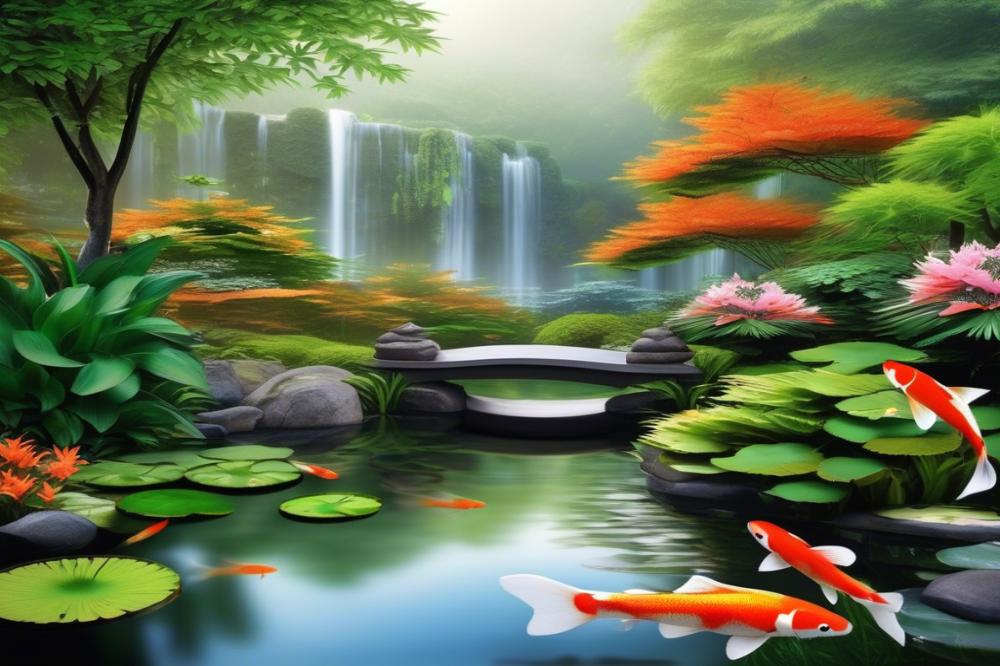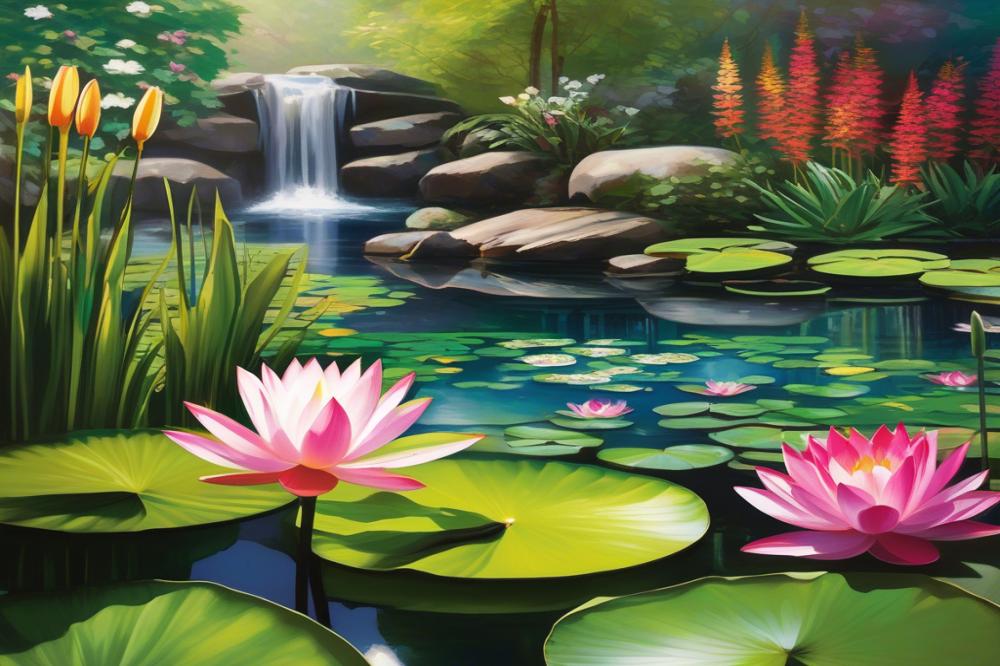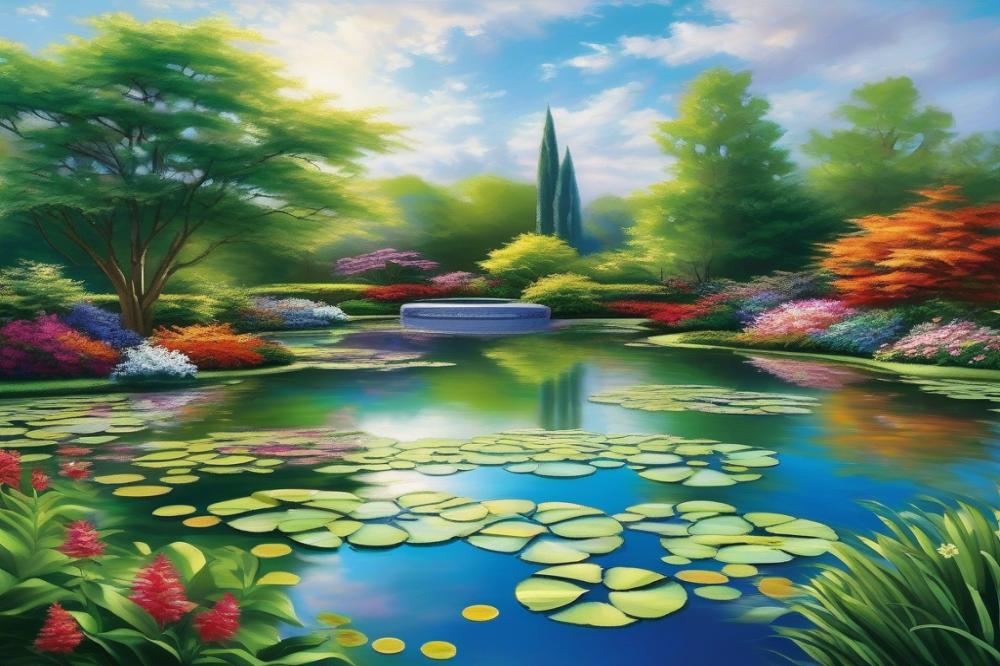Importance of Fish in Water Gardens
Fish play a crucial role in any water garden. They add beauty and life, turning a simple pond into an engaging ecosystem. Watching fish swim gracefully can be incredibly relaxing. In addition to aesthetic appeal, these creatures help maintain a healthy pond environment. Mixing various species creates a vibrant scene that captivates onlookers.
Benefits of Including Fish in Ponds
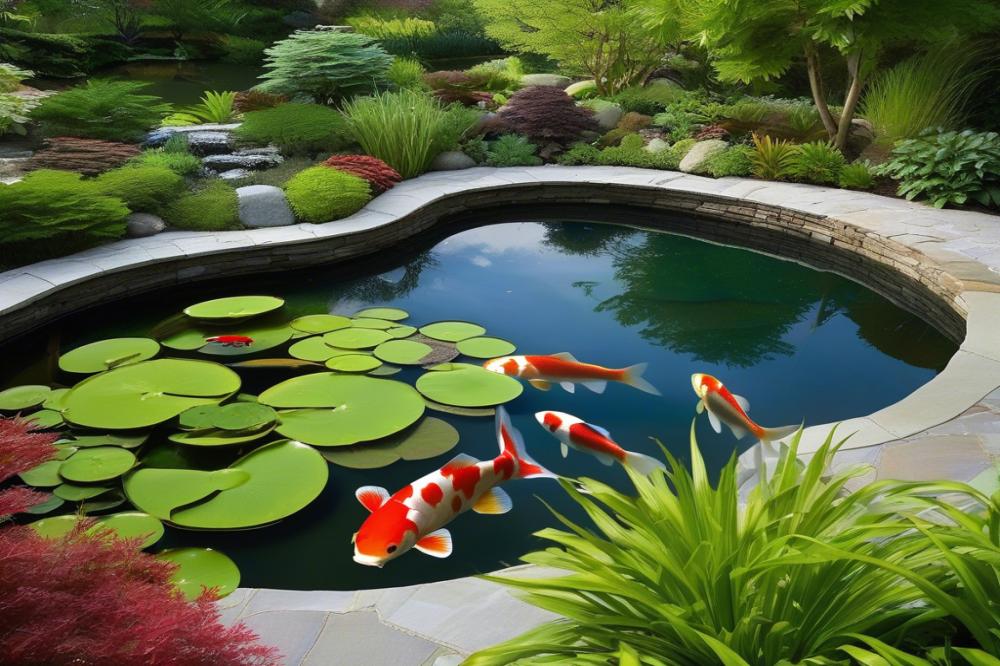

Including fish in ponds comes with numerous benefits. First, they help control algae growth. Specific pond fish species consume algae and other unwanted plants. This natural form of pest control decreases the need for chemical treatments. In addition, fish contribute to the pond’s overall health by breaking down organic matter and fertilizing the water. Some fish, like koi and fancy goldfish, boost the beauty of any outdoor area. They can also introduce unique colors and patterns.
Social enjoyment also increases with the presence of fish. Families and friends often find pleasure in watching fish interact with one another and their surroundings. Especially for children, feeding fish can be a delightful and educational experience. Teaching kids about the ecosystem fosters a sense of responsibility and care for nature.
Overview of Popular fish for water gardens
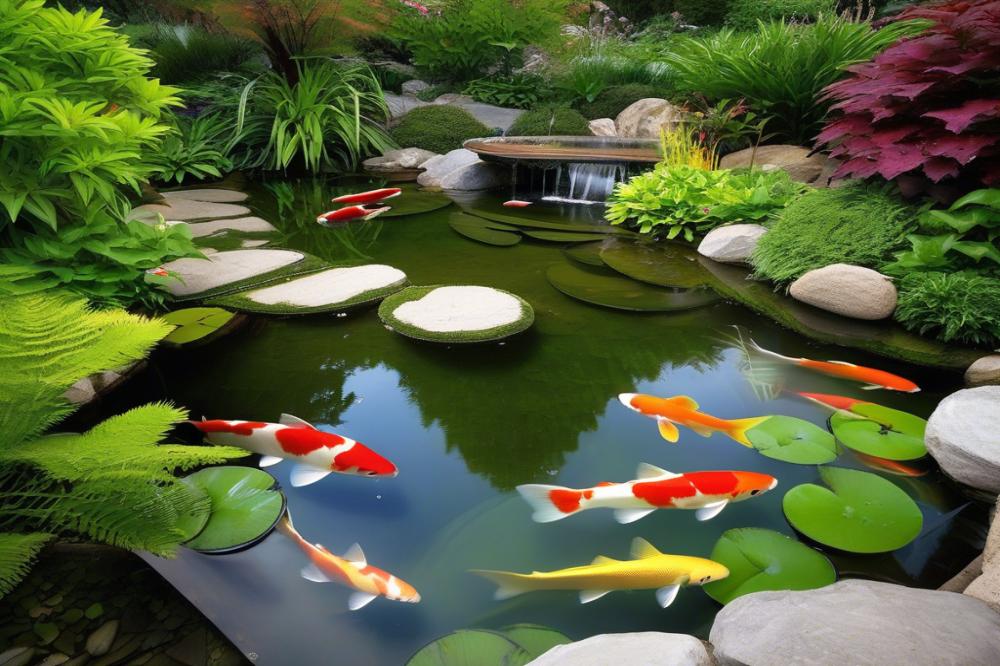

When considering fish for water gardens, several species stand out. koi are often the star of many ponds. Their colorful patterns and friendly nature make them a favorite. goldfish are another popular choice, known for their hardiness and wide variety of colors. Comets shine in their own right as swift swimmers with long tails. Shubunkins, with their speckled appearance, provide a unique visual appeal.
Mosquito fish are small but mighty, effectively controlling bug populations around ponds. They also add diversity to the aquatic community. Fancy goldfish, known for their ornamental features, can make any pond more attractive. Catfish are beneficial for pond care, as they help clean up debris from the bottom. Lastly, minnows and tilapia assist with algae management and serve as food for larger fish. In sum, each species contributes to the lively atmosphere water gardens strive to create.
Understanding Water Garden Ecosystems
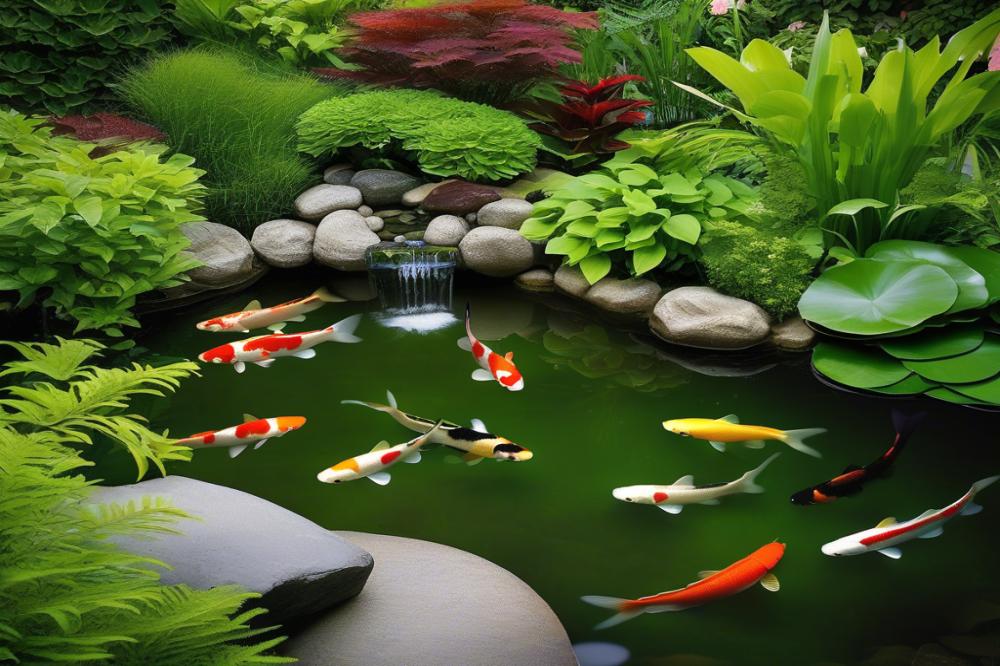

Water gardens are not just beautiful landscapes; they create a complex ecosystem. This ecosystem consists of various components working together. Plants, fish, and microorganisms all play a vital role. Understanding how these elements interact is essential for healthy pond care.
Role of Fish in Maintaining Balance
Fish are integral to a thriving water garden. They help control algae growth through their feeding habits. Koi and goldfish add color and movement to the pond, making it visually appealing. Comets and shubunkins are also good choices; their activity helps stir up the water, promoting oxygen circulation. It’s not just about aesthetics, though. Fish like mosquito fish consume mosquito larvae, reducing pests naturally.
Interaction Between Plants and Fish
Plants provide shade and shelter for fish. Water lilies and submerged plants are crucial in offering hiding spots. Without such plants, fish can become stressed or vulnerable to predators. In turn, fish contribute to plant growth. Their waste acts as a fertilizer, enriching the soil. Fancy goldfish graze on algae growing on plant leaves, preventing overgrowth.
Some fish, including catfish and minnows, help keep the pond clean. They sift through the substrate, allowing beneficial bacteria to thrive. This interaction fosters a balanced environment. Tilapia can also be beneficial; they are known for their ability to digest algae. A healthy ecosystem develops when each species plays its part. Overall, understanding these relationships provides insight into creating and maintaining a successful water garden.
Popular Fish for Water Gardens
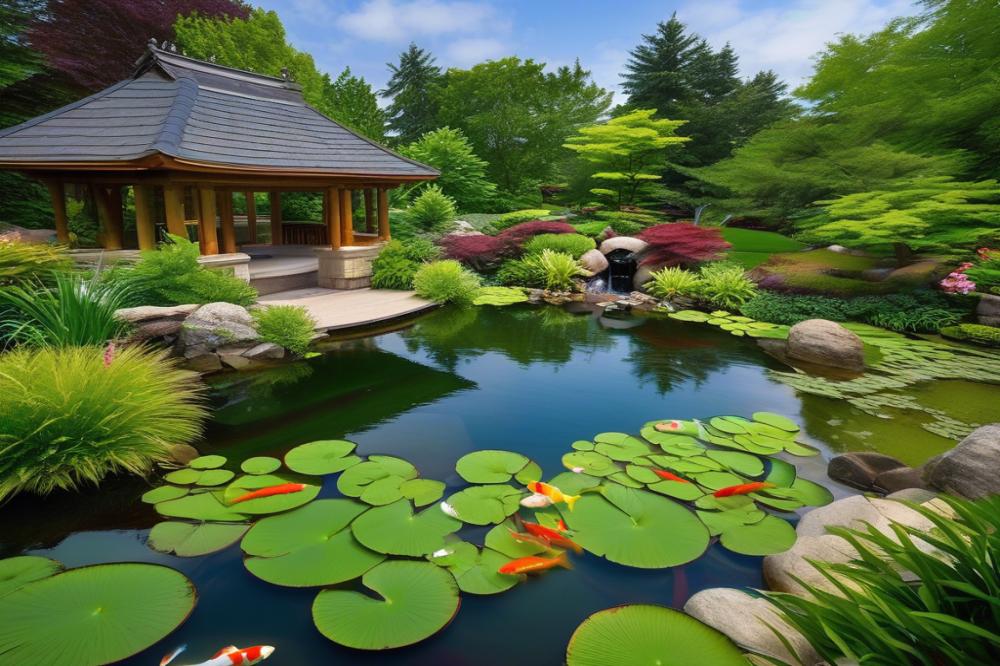

Koi
Koi are perhaps the most captivating fish for any pond. These large, colorful creatures can live for decades. They come in various patterns, which adds a delightful visual dynamic to your garden. Koi can create a lively atmosphere, attracting attention from family and friends alike. Their beauty is not just for show; they also contribute to the pond’s ecosystem by helping to keep it healthy. An ideal pond for koi should be at least three feet deep. This depth protects them from temperature fluctuations and predators. Clean water with appropriate filtration is essential as well.
Goldfish
Goldfish are a classic choice for many pond owners. Many varieties exist, including the charming fancy goldfish. These fancy types often have unique shapes and vibrant colors. Regular goldfish also make excellent companions. With proper care, they thrive in a pond environment. A balanced diet and clean water play pivotal roles in their health. Compatibility is essential. Goldfish can coexist well with koi, minnows, and even catfish. They can tolerate a range of conditions, making them low-maintenance options.
Comets and Shubunkins
Comets and shubunkins bring a splash of fun to any water garden. Comets feature long, flowing fins and are known for their active swimming. Shubunkins, on the other hand, are recognized for their calico patterns and sturdy bodies. Each of these fish enhances the pond’s beauty in its way. Their robust nature makes them resilient to various pond conditions. Including both in the same pond can create a vibrant and dynamic ecosystem. They are also excellent at controlling algae growth, providing a natural balance.
Mosquito Fish
Mosquito fish serve an essential role in keeping pesky insects at bay. Their appetite for mosquito larvae is unparalleled, making them beneficial for anyone wanting to enjoy their outdoor space without annoyance from bites. Additionally, these fish are easy to care for and breed quickly. They adapt well to different conditions, thriving in various water temperatures. This adaptability contributes to their popularity in many ponds. Regular checks on their population help prevent overcrowding, ensuring the pond remains a healthy environment.
Additional Fish Options for Ponds
Catfish
Catfish can be a great addition to your pond. They help with nutrient cycling. These fish consume organic matter at the bottom of the pond, which keeps the ecosystem balanced. When considering size, keep in mind that catfish can grow quite large. Therefore, sufficient space is necessary to accommodate them. A pond without enough room can lead to overpopulation issues.
Minnows
Minnows play an important role in the pond ecosystem. They provide food for larger fish such as koi and goldfish. Their resilience and hardiness make them great for various climates. Even in less-than-ideal conditions, minnows can survive and thrive. By including these small fish, you can contribute to a balanced food web. This balance is crucial for pond care and maintenance.
Tilapia
Tilapia offer unique attributes that can benefit water gardens significantly. They are known for their rapid growth and tolerance of warm water. If you live in a warmer climate, tilapia could thrive in your pond. However, bear in mind that they may not survive cold temperatures. Consider their lifecycle in relation to seasonal changes. Always think about how tilapia fit into your specific pond environment.
Pond Care and Maintenance
Water quality plays a crucial role in fish health. Koi, goldfish, and even minnows require clean water to thrive. Pollution or improper pH levels can lead to stress. This stress can weaken their immune systems, making them more susceptible to disease. Regular testing of water parameters helps maintain a stable environment.
Nutritional needs are equally important for your pond fish. Feed them a balanced diet to support growth and vitality. Koi and goldfish enjoy pellets, while comets and shubunkins appreciate both pellets and flakes. Fancy goldfish might require softer foods to avoid digestive issues. Additionally, providing occasional treats, like blanched vegetables, can keep them healthy and satisfied.
Seasonal Care Tips
Seasonal changes require different care techniques. In spring, clear debris and check for any damage from winter. As temperatures rise, consider adjusting feeding habits. Fish become more active and may require more food. However, be cautious not to overfeed, as uneaten food can pollute the water.
During summer, monitor water temperature closely. Fish, including catfish and tilapia, can struggle in extreme heat. Installing a fountain or aerator can help maintain oxygen levels. In fall, prepare for the colder months by cleaning the pond. Some fish, like mosquito fish, can survive in lower temperatures, but others need a more regulated environment. Keep an eye out for debris that may accumulate as leaves fall.
Winter care is vital if you live in a colder climate. Consider using a heater or de-icer to prevent the pond from completely freezing over. This is essential for fish survival. Establish a routine for checking the pond’s health, even in harsh weather. These practices will contribute significantly to the overall vitality of your aquatic ecosystem.
Final Thoughts on Creating a Thriving Pond
Recapping the benefits of adding fish to your water garden is essential. Choosing the right species can enhance the beauty of your space while promoting a healthy ecosystem. Options like koi and goldfish are popular for good reasons. They bring color and life while helping to keep algae at bay. Many fish also play a crucial role in controlling insect populations, making your pond a more enjoyable environment.
Creating a balanced ecosystem is vital for a successful pond. Introduce plants alongside your fish to provide shelter and food. A mix of native aquatic plants nourishes your fish and encourages beneficial microorganisms. This balance helps maintain clear water and reduces the chance of harmful algae blooms. Remember to consider the specific needs of each species you add. This will lead to a more harmonious community in your pond.
Enjoying a vibrant pond is one of the great rewards of gardening. Watching the fish swim gracefully can be a calming experience. Observing how they interact in their environment can deepen your appreciation for nature. A thriving pond attracts both wildlife and offers a peaceful retreat for you. Whether you’re an experienced gardener or just beginning, making thoughtful choices will lead to a stunning and lively water garden. Dive into this journey and make your pond a beautiful haven.

